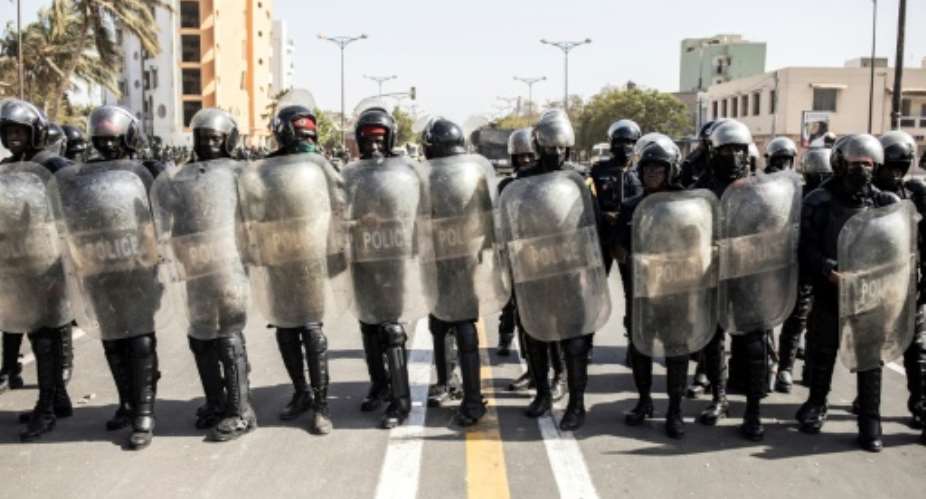Senegal's opposition suspended calls for massive protests on Tuesday as calm returned to the capital, days after a rape accusation against a rival to the president sparked the West African nation's worst unrest for years.
While tensions eased, military vehicles remained in position in the city's government quarter.
Usually seen as a haven of stability in a volatile region, the country was rocked by deadly clashes between opposition supporters and security forces which began last week and continued through Monday.
At least five people were killed in the violence, which was sparked on Wednesday by the arrest of Ousmane Sonko, a government critic popular with young people.
On Tuesday, some in central Dakar -- which had emptied the previous day in anticipation of unrest -- predicted that tensions would ease.
"I think things will calm down because Sonko has been released. He was unjustly arrested," said Grace Baramoto, a 37-year-old who said she stayed home for two days to avoid the turmoil.
"I see that the stores and supermarkets have reopened, that's reassuring," she added.
Adama Kane, a 27-year-old law graduate, also said he thought the decision to release Sonko had cooled tempers.
"If he had been imprisoned, it would have set the country on fire," he said.
A court in Dakar freed Sonko from detention on Monday, but it also pressed charges against him in a rape case which the opposition leader says is politically motivated.
In a sign of calm returning to the streets, an opposition collective known as the Movement for Defence of Democracy, or M2D, said Tuesday that it had scrapped plans for fresh protests on March 9 and 10.
The group, which includes Sonko's Pastef party, had called for mass anti-government protests over the weekend to protest the opposition leader's arrest.
'The revolution has started'
Sonko came third in 2019's presidential election and is considered a contender to replace President Macky Sall in 2024.
But his political future was thrown into doubt last month after a beauty salon employee accused him of raping her.
Sonko was arrested on charges of disturbing public order on Wednesday after his supporters clashed with police while he was making his way to court for the rape case.
But the move sparked a violent backlash which saw protesters hurl stones at police, torch cars and loot supermarkets, highlighting long-simmering grievances over living standards and inequality in the poor nation.
Military vehicles and police squadrons flooded Dakar on Monday ahead of Sonko's court hearing, which had been postponed, and thousands of protesters rallied on a central square in the seaside city.
The court freed Sonko but the formal rape charge has opened the way for a police investigation.
Speaking after his release, Sonko declared that "the revolution has already started and nobody can stop it".
He also urged the Senegalese people to keep demonstrating, adding that protests should be "much larger", but also peaceful.
M2D, while calling off its protests scheduled for this week, has nonetheless said that it has plans for future demonstrations.
Addressing the situation on Monday evening, Sall appealed to protesters to "avoid the logic of confrontation which leads to the worst".
The courts should be left to do their job "in all independence", he added, also announcing an easing of curfews in place in two regions, including Dakar.
Rape charge
To Senegal's political opposition, the rape case against Sonko fits a perceived pattern of prosecutions of government opponents.
The affair has drawn analogies with Karim Wade, the son of former president Abdoulaye Wade, who was prevented from running in the 2019 election after being convicted for graft.
The rape charge also comes amid uncertainty over whether the 59-year-old president will seek a third term.
Other West African presidents -- such as Guinea's Alpha Conde or Ivory Coast's Alassane Ouattara -- have used constitutional changes to win third terms.





 April 20: Cedi sells at GHS13.63 to $1, GHS13.06 on BoG interbank
April 20: Cedi sells at GHS13.63 to $1, GHS13.06 on BoG interbank
 Dumsor: I'm very disappointed in you for messing up the energy sector — Kofi Asa...
Dumsor: I'm very disappointed in you for messing up the energy sector — Kofi Asa...
 Dumsor: Instruct ECG MD to issue timetable and fire him for lying — Kofi Asare t...
Dumsor: Instruct ECG MD to issue timetable and fire him for lying — Kofi Asare t...
 Ashanti region: Road Minister cuts sod for 24km Pakyi No.2 to Antoakrom road con...
Ashanti region: Road Minister cuts sod for 24km Pakyi No.2 to Antoakrom road con...
 Train crash: ‘How could any normal person leave a car on rail tracks?’ — Frankli...
Train crash: ‘How could any normal person leave a car on rail tracks?’ — Frankli...
 Train crash: Driver of abandoned vehicle not our branch chairman nor secretary —...
Train crash: Driver of abandoned vehicle not our branch chairman nor secretary —...
 Kenya pays military homage to army chief killed in copter crash
Kenya pays military homage to army chief killed in copter crash
 US agrees to pull troops from key drone host Niger: officials
US agrees to pull troops from key drone host Niger: officials
 Mahama vows to scrap teacher licensure exams, review Free SHS policy
Mahama vows to scrap teacher licensure exams, review Free SHS policy
 Government will replace burnt Madina shops with a new three-story, 120-store fac...
Government will replace burnt Madina shops with a new three-story, 120-store fac...
